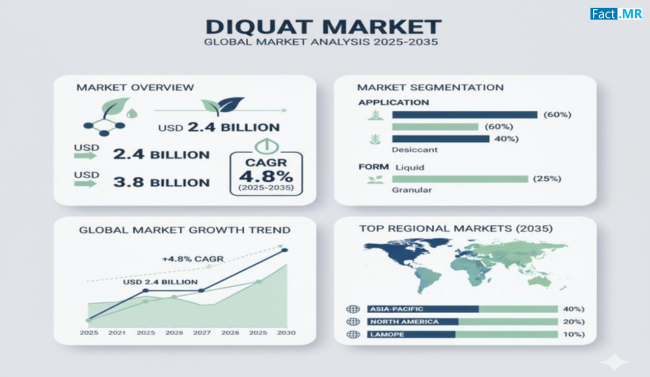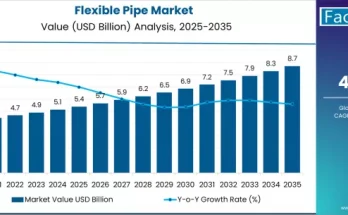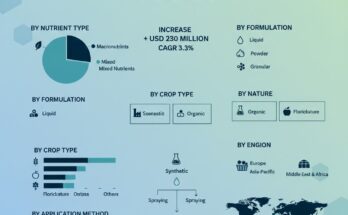As global agricultural practices evolve to meet the growing demand for food and crop quality, the diquat market is becoming increasingly significant. Diquat, a versatile herbicide, is widely employed for weed control, crop management, and pre-harvest desiccation. Its effectiveness, combined with rapid action and broad-spectrum application, makes it an essential tool for modern farmers aiming to maximize yield and maintain sustainable practices.
The rising focus on crop productivity, soil health, and efficient pest management has accelerated the adoption of diquat-based solutions across multiple agricultural sectors. As regulatory frameworks emphasize safe and effective chemical usage, diquat is positioned as a strategic solution for responsible farming practices.
Market Overview
Diquat is a contact herbicide widely recognized for its rapid action and ability to control a broad range of weeds and aquatic plants. Unlike systemic herbicides, diquat acts on the surface of the plant, causing rapid desiccation and enabling effective crop management. Its applications extend from pre-harvest crop desiccation to controlling weeds in non-crop areas, fallow fields, and water bodies.
The herbicide’s efficiency in weed management enhances crop productivity, reduces labor costs, and minimizes the environmental impact associated with overuse of chemical inputs. Modern formulations of diquat are designed to improve safety, application precision, and environmental compatibility, supporting sustainable agricultural practices.
Research and innovation in diquat formulations have led to enhanced solubility, stability, and compatibility with integrated pest management systems. These advancements enable farmers to implement precise and effective weed control strategies while adhering to regulatory and environmental standards.
Regional Insights
The adoption of diquat varies across regions, influenced by agricultural practices, crop types, and regulatory policies.
North America is a leading region in diquat adoption, supported by advanced agricultural infrastructure, extensive crop production, and adherence to sustainable farming standards. Farmers and agribusinesses leverage diquat for its efficiency in controlling weeds, maintaining high-quality yields, and streamlining pre-harvest operations.
Europe exhibits significant market activity due to stringent regulations on herbicide use, environmental considerations, and a strong focus on sustainable agriculture. Countries in Western Europe are adopting diquat strategically, balancing crop protection needs with environmental and safety compliance.
Asia-Pacific is witnessing growth in diquat usage, driven by expanding agricultural sectors, high demand for staple crops, and adoption of modern farming techniques. The region’s diverse crop cultivation patterns and government support for agricultural modernization are boosting the utilization of efficient herbicides like diquat.
Other regions, including Latin America and the Middle East & Africa, are gradually increasing diquat adoption as farmers seek cost-effective and high-performance solutions for weed control and crop management. The expansion of commercial farming and aquaculture also supports diquat market growth in these areas.
Key Trends & Forecast
The diquat market is evolving rapidly due to technological innovation, regulatory shifts, and changing agricultural practices. Key trends shaping the market include:
- Integrated Pest and Weed Management: Diquat is increasingly incorporated into integrated weed management strategies, reducing dependency on multiple chemical inputs and promoting sustainable farming.
- Advanced Formulations: Innovations in liquid, granular, and ready-to-use formulations are improving application efficiency, reducing environmental impact, and enhancing crop safety.
- Sustainable Agriculture Practices: With rising awareness of eco-friendly farming, diquat is utilized responsibly, aligning with practices that minimize chemical runoff and soil degradation.
- Pre-Harvest Crop Desiccation: Diquat continues to be a preferred choice for pre-harvest desiccation, ensuring uniform ripening and facilitating mechanized harvesting.
- Aquatic Weed Management: Its effectiveness in controlling invasive aquatic plants supports water body maintenance and irrigation efficiency.
- Regulatory Compliance: Stringent safety guidelines and application standards are driving innovation in precise application techniques and formulation improvements.
These trends indicate a strong market trajectory for diquat, driven by the need for efficient, reliable, and sustainable herbicide solutions in modern agriculture.
Applications & End-Use Outlook
Diquat finds applications across a range of agricultural and environmental management areas:
- Crop Production: Used extensively in cereals, pulses, oilseeds, and horticultural crops for weed control and pre-harvest desiccation.
- Non-Crop Weed Management: Applied in fallow fields, roadsides, and industrial areas to manage unwanted vegetation efficiently.
- Aquatic Weed Control: Utilized in irrigation channels, lakes, and ponds to prevent excessive growth of aquatic plants that can disrupt water management.
- Integrated Farming Systems: Diquat is integrated with other crop protection and pest management measures to optimize yield, reduce labor, and maintain soil health.
- Commercial and Industrial Applications: Used in large-scale agricultural operations, including plantations and commercial farms, for precise and effective weed management.
The versatility and reliability of diquat make it a critical component in the agricultural toolkit, supporting productivity, environmental stewardship, and operational efficiency.
Conclusion
The diquat market is playing an increasingly important role in modern agriculture by providing a rapid, reliable, and versatile solution for weed and aquatic plant management. Its integration into sustainable farming practices, pre-harvest operations, and industrial applications underscores its strategic importance in crop management.
As global agricultural practices evolve toward higher productivity, efficiency, and sustainability, diquat will continue to be a preferred herbicide for farmers, agribusinesses, and environmental managers. Companies adopting innovative formulations, responsible application techniques, and integrated management strategies will be well-positioned to capitalize on the growing demand for efficient and environmentally compatible weed control solutions.
Diquat represents more than a chemical input; it is a key enabler of sustainable, modern, and efficient agricultural practices, supporting food security, environmental protection, and operational productivity across diverse farming landscapes.
Browse Full Report – https://www.factmr.com/report/upcycled-ingredients-market



